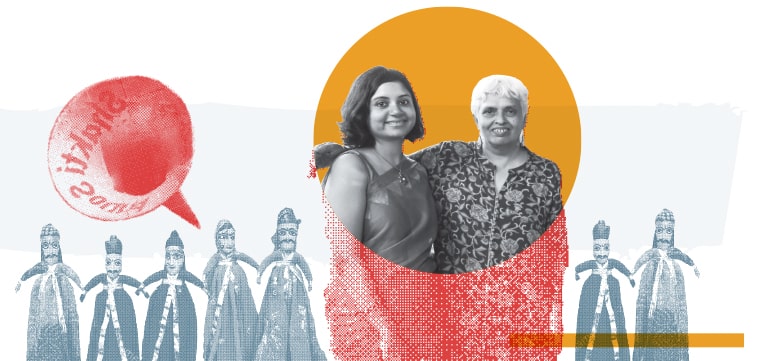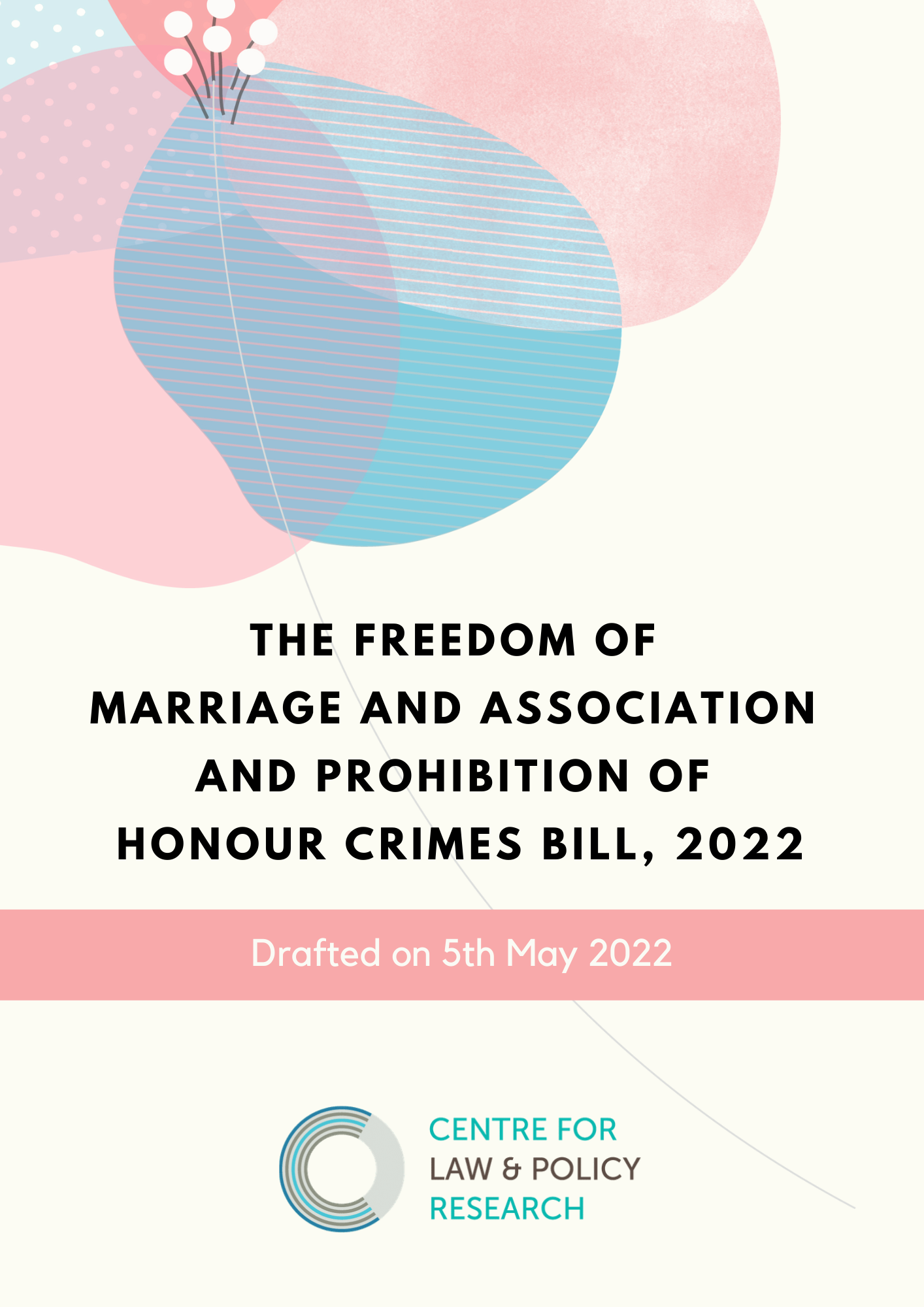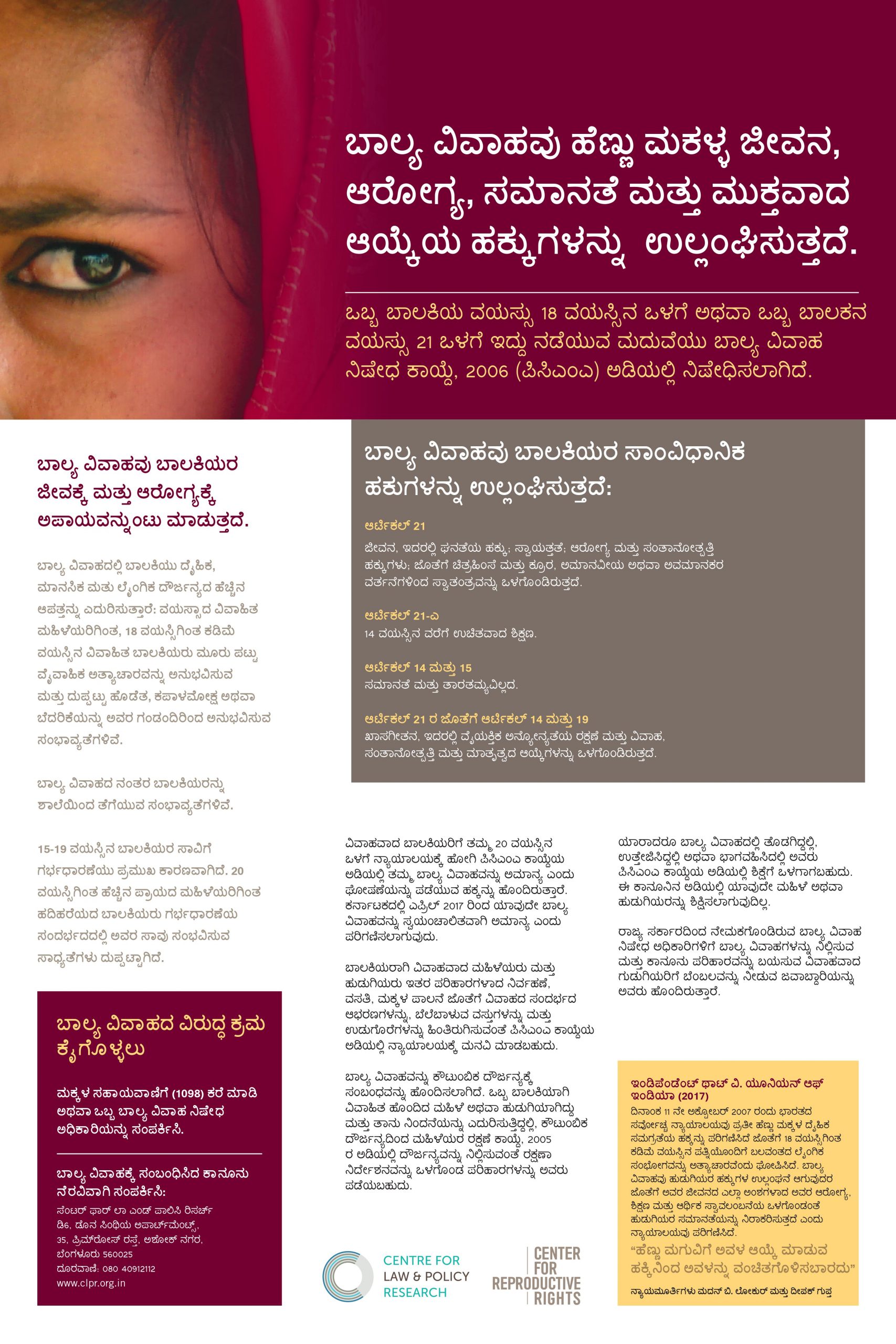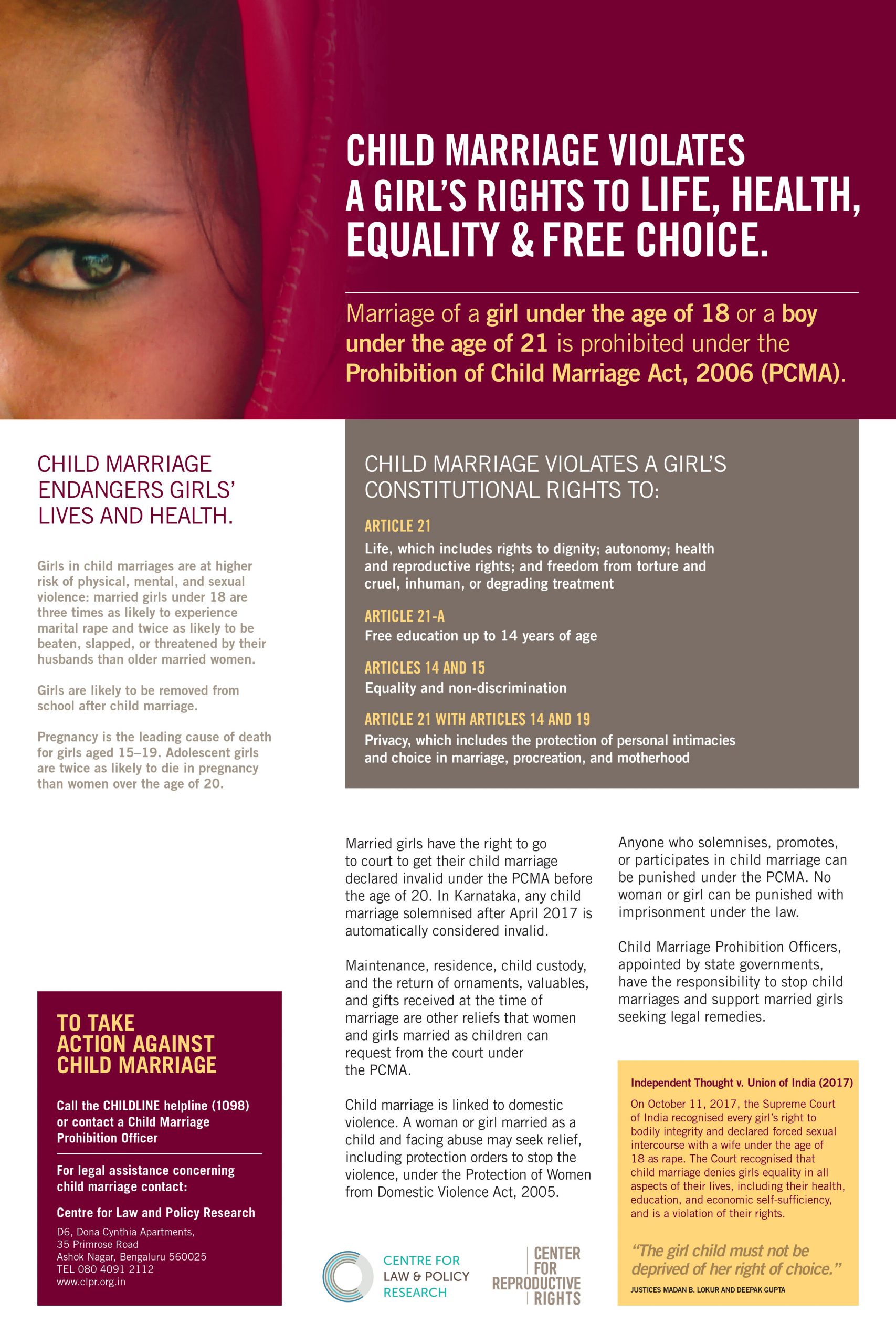For Full Equality of Women, Marital Rape Exception Must Go
In this article published by the Indian Express, Jayna Kothari examines the recent split verdict by the Delhi High Court on the criminalisation of marital rape.
Gender & Sexuality
Gender & Sexuality

In this article published by the Indian Express, Jayna Kothari examines the recent split verdict by the Delhi High Court on the criminalisation of marital rape.
A legislation drafted by CLPR which provides the legal framework to prevent, investigate and adjudicate crimes in the name of ‘honour’ and protect individual liberty.

In this article published by the Hindu, Jayna Kothari, examines the regressive exception to marital rape in light of the recent Karnataka High Court judgment.
In this article published by Indian Express, Jayna Kothari, Senior Advocate & Executive Director at Center for Law and Policy Research argues that the recent Priya Ramani judgment has expanded the law on sexual harassment and provided the opportunity to widen the defences against defamation law. Most importantly, she states that now, victimisation should also be recognised as a form of sexual harassment and discrimination.
Writing for the Deccan Herald, Senior Advocate Jayna Kothari responds to recent controversy concerning Chief Justice of India, Ranjan Gogoi. With a review of the present state of justice when it comes to violence against women, she argues that the problem lies in implementation.
Contributing to The Print’s Talk Point, Satya Prasoon argues that the Supreme Court of India must embrace “substantive due process”, in order to regain credibility. The Supreme Court is an credibility crisis after sexual harassment allegations were raised against the Chief Justice of India, Ranjan Gogoi.
As part of our collaborative work with Centre for Reproductive Rights, we translated easy-to-understand FAQ Brochures on Child Marriage for our outreach in Karnataka. The brochure contains the relevant legal framework around Child Marriage in India.
As part of our collaborative work with Centre for Reproductive Rights, we translated easy-to-understand Posters on Child Marriage for our outreach in Karnataka. The poster contains the relevant legal framework around Child Marriage in India.

As part of our collaborative work with Centre for Reproductive Rights, we disseminated easy-for-reference Posters on Child Marriage for our outreach. The poster contains the relevant legal framework around Child Marriage in India.

As part of our collaborative work with Centre for Reproductive Rights, we disseminated FAQ Brochures on Child Marriage for our outreach. The brochure contains the relevant legal framework around Child Marriage in India.
A little more than a month ago, on 17th Oct 2017, in the Child Marriage and Marital Rape [Independent Thought vs Union of India] case the Supreme Court ruled that sexual intercourse or sexual acts between a man and his minor wife was marital rape. In legal terms the Supreme Court had read down Exception 2 to Section 375 of the Indian Penal Code. This exception had deemed that a man could not be accused of marital rape if he had marital intercourse with his minor wife as long as the wife was not below the age of 15. Reading down the exception now meant that this exception would not apply to cases where the wife was between 15yrs and 18yrs.
Disha Chaudhry wrote about the reasoning behind this judgement in the Oxford Human Rights Hub.
In this Article published in the Kannada Daily, Prajaavaani, Jayna Kothari critiques the decision of the Supreme Court holding Section 2(q) of the Protection of Women from Domestic Violence Act, 2005, to be unconstitutional. The impugned section defines “respondents” under the Act to only include “adult males”, thus allowing aggrieved persons under the Act to file a case only against adult male relatives.
Jayna Kothari argues that provisions of the Domestic Violence Act are not meant to be construed as gender neutral. She elaborates how it is necessary and intentional that legal provisions on violence against women should apply only to males as perpetrators of such violence.
This article, reviews the performance of Special Courts established under the Protection of Children from Sexual Offences (POCSO) Act 2012. Using empirical data, from a study conducted by the Centre for Law and Policy Research, the author exposes the failure of these courts in meeting their objective.
Nina de Puy Kamp who interned with CLPR has an article on granting interim compensation to rape victims in Karnataka published Deccan Herald. (September 21,2015)
This article provides an insight into the performance of fast track courts set up for sexual harassment in Karnataka. The authors analyse the performance of such courts on the basis of an empirical study conducted by them.
Fast track courts have often been mooted as a solution to the extensive delays that plague the functioning of “normal” courts in India. In 2012 a special court to exclusively try cases of child sexual abuse under the “Protection of Children from Sexual Offences Act, 2012 (“POCSO”)” was set up. In 2013, the Karnataka state government set up 10 special fast track courts in the state only for trying cases of rape and sexual assault against women under Section 376, IPC.
The Justice J.S Verma Committee Report had recommended the setting up of Fast Track courts for dealing with rape and sexual assault as a way to ensure speedy justice. In this article, the authors conducted a detailed study of the working of three such courts in Bangalore that were set up in December, 2013 and examine whether these courts live up to their objective. The article makes a case for the need for witness protection services, so as to safeguard the interests of the victim of sexual assault before and after they have provided evidence.
In this article, Jayna Kothari has brought to light the manner in which guidelines on sexual harassment laid down by the Supreme Court in the Vishakha judgment are being flouted. She also talks about the inherent bias in the legal profession against women lawyers and the need to recognize such biases while interpreting the law in relation to sexual harassment.
The India at LSE Blog has featured a guest post by Jayna Kothari on the Madras High Court judgment of Aysha v Ozir Hassan. This judgment had made headlines for suggesting that couples who have premarital sex can be considered to be married. In her post, Jayna argues that contrary to the popular understanding, this judgment strengthens the position of women in relationships akin to marriage.
The Protection of Women from Domestic Violence Act, 2005 aims to provide women with quick decisions on protection, residence, maintenance and child custody. This is an account of how the best intentions of the law are thwarted in the process of implementation.
Every legal system has its own story and unique experiences with the sexual harassment law. This article engages in a comparative study of sexual harassment in India and Israel, which seem to share a very similar trajectory. This article tracks the processes that shaped the reforms in both countries and uncovers significant similarities and differences in the Indian and Israeli sexual harassment law. It suggests that while the Israeli law is more robust in both its substantive scope and its enforcement, it has for this very reason, also experienced a significant backlash which is, interestingly not traced in the Indian context.
Jayna Kothari and Daphne Barak Erez have published an essay titled ‘When Sexual Harassment Law Goes East: Feminism, Legal Transplantation and Social Change’ (Stanford Journal of International Law, Issue 47, p. 177, 2011).
This article analyses the role of the criminal law system in dealing with domestic violence. It argues that Section 498 A of the Indian Penal Code can only be effectively implemented if a new model of policing and a victim empowerment criminal law model is developed.
Filter by
By Types
CLPR represented the intervenor Vimochana in the Supreme Court and challenged the constitutionality of the offence of adultery under Section 497 of the IPC. We argued against adultery as an offence by invoking the fundamental right to privacy and argued that the right to intimate association is a facet of privacy which is protected under the Constitution. The Supreme Court unanimously struck down Section 497 of the Indian Penal Code as being violative of Articles 14. 15 & 21 of the Constitution.
Mr. Shiv Kumar challenged the constitutionality of Section 10A of the Indian Divorce Act, 1869 alleging that this provision amounted to discrimination based on religion and violated the constitutional guarantee of equality under Article 14. CLPR represented Vimochana and supported the petition and argued additionally that in cases where women are facing domestic violence and harassment at the hands of the husband, in many instances they opt for a quick separation.
05th
Jul 2024
Venue Centre for Law & Policy Research, Bengaluru
Time 5 PM - 7 PM | 9:30 AM - 5:30 PM | 10 AM - 2 PM
28th
Sep 2023
Venue Association Hall, High Court of Karnataka, Opposite Vidhan Soudha, Bangalore -560001
Time 09:30 AM - 05:00 PM
12th
Jan 2023
Venue Institute of Development Studies in Jaipur, Rajasthan
Time 10 am - 5 pm
07th
Dec 2019
Venue Centre for Law and Policy Research, Bangalore
Time 4:30pm
On August 16, 2005, the Maharashtra government summarily banned dancing by bar girls in Mumbai’s 1,250 dance bars. The amended Bombay Police Act prohibited dancing in any establishment where alcohol was served, but the prohibition was selective: five star hotels, clubs and upscale discothèques were exempt.
Read moreThe Week
Deccan Herald
In cases of custodial violence, police stations often transform into sites of human rights violations. The Centre for Law & Policy Research (CLPR) gets referenced in this article highlighting systemic failures, calling for accountability and reforms to protect citizens’ rights within police custody.
Citizen Matters
Women workers in Chennai’s unorganized sector face significant challenges in addressing workplace sexual harassment, largely due to lack of awareness about Local Complaints Committees (LCCs). Referencing CLPR’s report revealed Chennai’s LCC received only one complaint from 2014-2019. The article explores factors contributing to underreporting, including job insecurity and absent support systems, while suggesting improvements to LCC accessibility and functionality.
The New Indian Express
Holenarasipura JDS MLA HD Revanna, who is facing allegations of sexual harassment was granted bail on Monday by the 42nd Additional Chief Metropolitan Magistrate (ACMM) court and Judge Preeth J. Additional Special Public Prosecutors Ashok Naik and Jayna Kothari (Executive Director of CLPR) appeared for the prosecution.
In an era where technology and human interaction are increasingly intertwined, the boundaries of personal space and consent have extended to the virtual realm.
CLPR recently organised a National Consultation on the Resource Book on Women’s Rights Judgments in India with the aim of making landmark women’s rights judgments accessible to communities, legal practitioners, researchers and activists.
CLPR had a fabulous training session for our Constitution Defenders Fellows from 05-07 July, 2024, on Public Interest Litigation (PIL) & Domestic Violence Remedies.
CLPR participated in a two-day consultation on its draft ‘The Freedom of Marriage and Association…